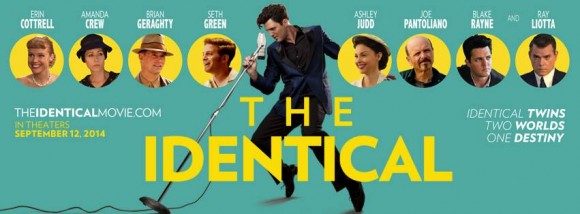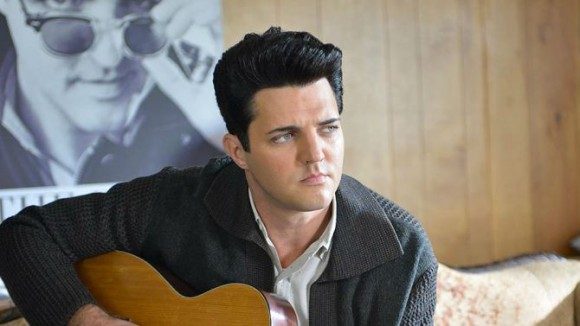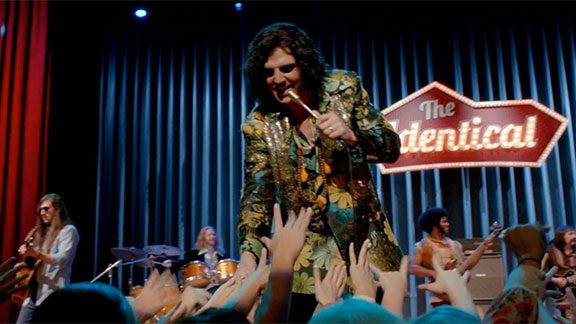The Identical is a film that feels like it started out as an Elvis Presley bio, but the producers had trouble getting the rights and settled for an imagined story with a knock off Elvis instead. Yes, first timer Blake Rayne is actually an Elvis impersonator, and the root of the movie is about Depression-era parents who are forced to give up one of their identical twin boys to be raised by a preacher and his wife because they’re too poor to take care of both boys. Presumably to hide their shame at giving away their child, the couple fakes his death, and we’ve come back around to the Elvis parallels for what won’t be the last time (Presley famously had a stillborn twin brother).
The story really kicks in the 1950s, once the boys are approaching manhood and the one who stayed with his birth parents has become a rock star. Not that we ever get a chance to know him; the story is told from the perspective of the other brother, Ryan Wade, with merciless consistency. This is not the tale of two brothers reuniting (they know nothing of one another). Instead it’s the tale of young Ryan trying to throw off the well meaning but constricting designs of others around him – namely his father – and find his own way in the world. Which might be fine, except that it’s very easy to imagine that the rock star, named Drexel “The Dream” Hemsley, has a far more interesting life, and equally difficult to imagine that a force so strong as the screenplay would exist to keep Ryan and Drexel from meeting one another were they real people.
See, Ryan’s really a pretty boring figure, not helped by an amateurish performance from Rayne. And oddly enough, it’s his time on stage that’s some of the worst. Maybe it’s fake energy from a crowd of extras instead of fans, but Rayne rarely looks comfortable on stage unless he’s doing the sort of gyrations you’d typically associate with Elvis. To his credit, he doesn’t come off too badly in the scenes where he’s not singing, but that seems to be because Ryan is a pretty flat character emotionally, and so there’s not much asked.
More unexpected is very poor performance from Ray Liotta as Ryan’s adoptive father. The film is set in the south (to follow the Elvis parallel), and Liotta simply can’t do a believable southern accent. For that matter, neither can Ashley Judd (Ryan’s mother) or Seth Green (his friend), or really anyone except Rayne and Erin Cottrell, who’s passable as Ryan’s wife and the narrator. But while the latter three actors play resoundingly one dimensional characters, the relationship between Ryan and his father is intended to be one of the film’s central points of conflict, and though Liotta screams away from time to time, he’s never emotionally convincing.
That emerges as an unfortunate pattern for the film – always a step below professional standard, never truly convincing. A lot of this has to do with the plot, which borrows liberally from a variety of sources, but never produces anything meaningful. Johnny Cash is the model at first, but Ryan lacks the same vocational angst and inner demons that made the Man in Black so compelling. Later, Blake Rayne’s personal history as an Elvis impersonator seems to be the model, as Ryan wins a Drexel Hemsley impersonator contest and spends a time touring as such. Later still, conflict with the father inexplicably reemerges, leading to a wholly unfulfilling denouement. Some individual scenes are fun – if you like rockabilly music, there are some ok songs, and the criminally underutilized Joe Pantoliano crops up as Ryan’s employer – but individual scenes never add up to anything that feels substantive.
And like Drexel parallels Ryan, there are interesting ideas the film could have explored. An early scene at a honky tonk shows Ryan as about the only white man in in the joint (and remember, this is the 1950s), but racial relations are never discussed. Likewise, Ryan is a devout preacher’s kid who dives unquestioningly into the world of rock and roll. Heck, at the same honky tonk he sings a song with the phrase “rock and roll” in the lyric, apparently oblivious to the fact that at the time it was a widely used euphemism for sex. Yet neither a discussion of religion nor one of ethics is given any more than a superficial treatment.
This is still true of one of the strangest runners of the film – secondary focus on Judaism. There’s an entire scene devoted to the Six Days War and several other occasions on which Judaism and Jewish imagery is prominently featured. And that would all be fine except that it has nothing to do with the plot or any of the characters!
The Verdict: 2 out of 5
The simple truth is that The Identical is, ironically, a movie without identity. The plot goes in ten different directions without leading anywhere very interesting. Character actions are usually believable, but rarely explained (including, most damningly, several elements of the “separated at birth” premise which I haven’t even bothered to address here, so little do they actually show up). And performances, especially among the key cast, don’t deliver the emotional punch they need. There’s some casual enjoyment to be had, I suppose, especially in some of the music, but the myriad of little annoyances add up very quickly, indeed.



